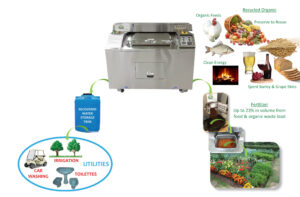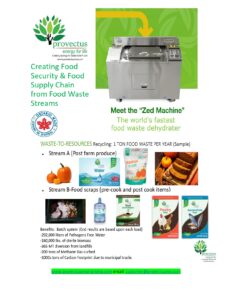“People of the Portal”: Provectus addresses global sustainability challenges
In our “People of the Portal” series, we highlight innovative and entrepreneurial members of the Cleantech Commons Cleantech Innovation Portal and celebrate the achievements of Portal members.
This week, we are delighted to let you know more about a Cleantech Commons Cleantech Innovation Portal client, Provectus Enterprising Inc.
Provectus is helping to create food security all while addressing landfill diversion, curbing GHG emissions, creating a circular economy, and helping create green jobs for the local workforce.
 Their Zed Machine (“the world’s fastest food waste dehydrator“) is directly helping recycle food waste streams help and creating circular economy solutions from farm produce and food scraps.
Their Zed Machine (“the world’s fastest food waste dehydrator“) is directly helping recycle food waste streams help and creating circular economy solutions from farm produce and food scraps.
This solution was highlighted recently in a Zero Waste Initiative webinar hosted by the Canadian Institute of Food Science & Technology.
You can view that session with Provectus Founder and Managing Director, Zack H. Abdi here!
Why the Zed Machine? (Hint: view the “Provectus Green Stars Initiative” for hotels here! or their solution for high-rise buildings here!)
- Retrofit
- Modular
- Scalable
- Batch system
- Closed loop solution
- No Enzymes or bacteria
- Customize “Turnkey” solution
- Full audits for Carbon Credit
- Full training embedded for operational
- A full batch of 1 ton is less than 23 hours

Abdi also presented at the Canadian Food Summit in London, Ontario, held from June 7 to 9. His presentation was titled “How to create food security and food supply chain while addressing landfill diversion and creating circular economy”.
Provectus is also working, in collaboration with Agriculture and Agri-Food Canada on R&D for food security and the food supply chain from food waste streams A (post-farm produce) & B (food scraps, both pre- and post-cook): in particular, focused on helping water stress and water footprint issues as well as creating sterile biomass for soil amendments to support regenerative agriculture best practices.
Provectus engagement is helping create a legacy by introducing the Provectus Eco Warrior Program designed for K2I (Kindergarten to Industry) including universities for undergraduate and post-graduate studies. Food waste streams from campus cafeterias can be recycled and reused for various applications that can help reduce landfill stress and curb GHG.
Provectus will participate in the upcoming Green Expo in Mexico and WETEX in Dubai, UAE, and is scheduled to be part of the Canadian Trade Mission to India.
Abdi points out that landfill diversion is a crucial element of sustainability – as most landfills are full and overcapacity.
Landfills do not provide a sustainable long-term solution due to toxic chemicals, and most items are not biodegradable.
They are also expensive and take a long time to build – in addition to being a source of CH4 (Methane Gas and other GHGs).
In addition, leachate issues are rampant and not sustainable. (Leachate is any contaminated liquid that is generated from water percolating through a solid waste disposal site, accumulating contaminants, and moving into subsurface areas.)
Abdi believes that creating economic growth to meet the challenges of economic equality is also crucial.
“Rural and Indigenous communities are facing a lack of waste management services, creating infestation and hygiene issues,” he argues. “Rodents, cockroaches, flies, and even raccoons are some of the major issues facing many.”
To learn more, visit www.provectusenterprising.com or e-mail customer@provectusme.com
Cleantech Innovation Portal
The Cleantech Commons Cleantech Innovation Portal is all about helping Canadian ventures in the cleantech sector create opportunities for growth, scaling, funding, and commercial success. To learn more or to sign up for free, click here!


